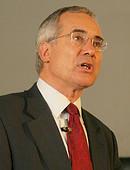Investors Worth $13 Trillion Urge Strong Global Climate Treaty
NEW YORK, New York, September 16, 2009 (ENS) - The world's largest global investors today issued a joint call for strong action this year from U.S. and international policy makers to control global warming. Signed by 181 investors, who collectively manage more than $13 trillion in assets worldwide, the statement on the "urgent need for global agreement on climate change" was released at the International Investor Forum on Climate Change in New York.
Hosted by New York State Comptroller Thomas DiNapoli and keynoted by British economist Lord Nicholas Stern, the forum comes in advance of key negotiations in Copenhagen this December to finalize a new international climate change treaty to take effect after the Kyoto Protocol expires at the end of 2012.
"Unmitigated climate change poses a threat to the global economy," said Stern. "But building a low carbon economy creates opportunities for investment in new technologies that promise to transform our society in the same way as the introduction of electricity or railways did in the past."
 |
Abengoa Solar's power tower in Seville, Spain, the world's largest solar generating station of its kind. (Photo courtesy Abengoa) |
Investors are already starting to invest in a low-carbon world that is "cleaner, quieter, safer and more biodiverse," said Stern, who chairs the Grantham Research Institute on Climate Change at the London School of Economics and serves as special advisor to the group chairman of HSBC on economic development and climate change, "but these investments will be much more effective if the right climate policies are in place. Investments will drive the political process."
Building a low-carbon world to reduce climate change is an enormous investment opportunity, all forum speakers agreed, but the right policies must be put in place with a strong agreement at Copenhagen that will lead to a price on carbon emissions that discourages emitters from using the atmosphere as a waste disposal facility.
"We must chart a new course toward long-term, sustainable business practices," said DiNapoli, who heads the $116.5 billion New York State Common Retirement Fund and its $500 million green strategic investment program. "We cannot drag our feet on the issue of global climate change. I am deeply concerned about the investor risks climate change presents, and the human cost of inaction is unthinkable."
"Naysayers may remain but the vast majority of scientists agree that climate change is real and is accelerating," DiNapoli said.
"Climate change poses a significant risk to the global economy, the comptroller said, estimating that the risk could reach "as high as 20 percent of global GDP."
He said the investors are "convinced" that with a strong climate agreement in place there will be "significant opportunities for global growth."
"Investors have a crucial role to play in building a low-carbon, energy efficient global economy," said Mindy Lubber, president of Ceres and director of the Investor Network on Climate Risk, which co-convened today's forum. "But without strong policies that encourage clean technologies and discourage high-polluting technologies, their hands are tied."
 |
Mindy Lubber (Photo courtesy Ceres) |
Lubber said the investors are urging world leaders to "act in concert."
"The problem is too big for any one country," she said. "We need clear market signals. If there is a cost of carbon emissions, a cap on carbon, we will have flow of capital. Investors see these opportunities."
The investors' statement calls for a climate change treaty that sets a global target for emissions reductions of 50 to 85 percent by 2050 compared with a 1990 baseline.
This goal, first proposed by thousands of climate scientists with the Nobel-Prize winning Intergovernmental Panel on Climate Change against a 2000 baseline, would require emissions to stop increasing by about 2015.
With that level of reductions, the average warming worldwide could be limited to about two degrees Celsius (3.6 degrees Fahrenheit) by the year 2100, the warming level that could avert the worst consequences of climate change.
For developed countries, the investors want emissions reduction targets of 80 to 95 percent by 2050, with interim targets of 25 to 40 percent by 2020, backed up by effective national action plans.
For developing countries, the investors' statement calls for national action plans that deliver "measurable and verifiable emission reductions."
 |
Lord Nicholas Stern (Photo by UK Foreign and Commonwealth Office) |
Stern said, "Progess over these last two to three years has been quite remarkable, and I think we've got a good chance for getting all that. Maybe we won't get all the details of the treaty framed up at Copenhagen, but we need clear sense of direction."
Just back from China, where he worked with economists and engineers on the country's 12th Five Year Plan set to start at the beginning of 2011, Stern said, "It will have emissions reduction goals."
India has plans to produce up to 20 gigawatts of electricity from solar by 2020 and to have solar power generation competitive with coal by then, Stern told the investors.
"Brazil has strong carbon action plan, and a plan to cut deforestation by 70 percent by the end of the decade, he said.
Japan has made a commitment to achieve 20 percent emissions reductions by 2020.
"These plans were not there two to three years ago," Stern said. "The world does want an agreement."
"It's true there are elements of distructiveness and 'I won't make my commitment till I see your commitment,'" he acknowledged, but said world leaders would not come to this kind of gathering if they were not sure that progress could be made."
In their statement, the investors also called for:
- Government support for energy efficient and low carbon
technology
- Measures that support the move to an effective global carbon
market, including ambitious caps, fair and efficient allocation of
allowances and links between different trading schemes
- Revisions to the Kyoto Protocol's Clean Development Mechanism to
ensure real, permanent and verifiable emission reductions
- Public financing mechanisms that leverage private sector finance
for investment in developing countries
- Measures to reduce deforestation and promote afforestation
- Support for adaptation to unavoidable climate change impacts
"A global agreement should provide support for action at regional and national levels to better predict, prepare for and respond to the physical impacts of climate change," they stated.
Rob Lake of the Netherlands who represents APG Investments and the European Institutional Investors Group on Climate Change, IIGCC, said, "The single most important thing that will drive investors are long, loud and legal signals from governments."
 |
Turbines at the Brazos Wind Ranch in Texas (Photo by D.A. Black courtesy NREL) |
"To drive funds to developing countries, said Lake, "investors need more than long, loud and legal signals because there are are political risks, technology risks, and currency risks. But if we can get the policy mechanisms right, that could unlock large amounts of capital."
"The stage is set for a series of decisions which will be critical to how climate change investment advances post-2012, said IIGCC Chairman Peter Dunscombe.
"To date, investment decision-making has been hampered by weak, disparate and uncertain policies, as well as short time horizons," Dunscombe said. "The specific measures we have called for today will provide a much more supportive investment environment, thus enabling long-term private sector investment and liquidity essential to address climate change. Failure to act is an option which carries with it damaging consequences."
Lubber said the investors have a "special message" for the U.S. Congress. "Do not delay in passing critical cap and trade legislation this fall. Do not squander this opporntunity to create new jobs and regain leadership."
"In answering those who question why the U.S. should adopt strong climate change policies, it's not strong enough to say we have an obligation," said California State Treasurer Bill Lockyer. "We owe a duty to all those who come after us to act now. If we fail to lead, if we adopt the attitude that we're not going to act until enough other nations act, we will violate that duty. And we will run an even greater risk of leaving future generations a damaged planet and diminished hopes for prosperity."
Today's Investor Forum was sponsored by the New York State Comptroller, Ceres, the European Institutional Investors Group on Climate Change, the Investors Group on Climate Change Australia/New Zealand, the P8 Group, and UNEP Financial Initiative.
Click here to view the "2009 Investor Statement on the Urgent Need for a Global Agreement on Climate Change."
Copyright Environment News Service (ENS) 2009. All rights reserved.
To subscribe or visit go to: http://www.ens-newswire.com